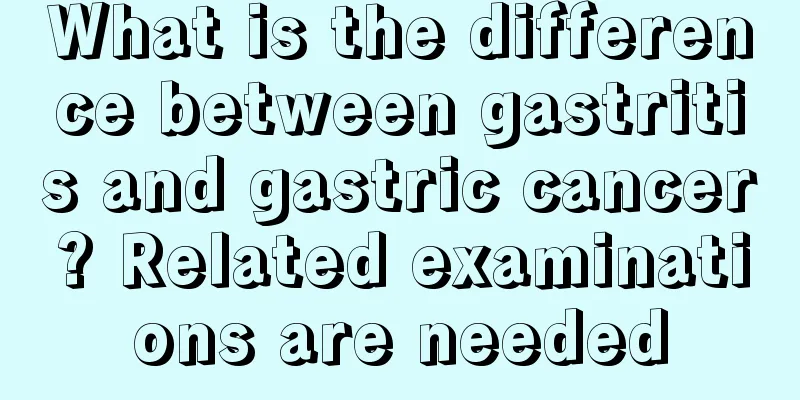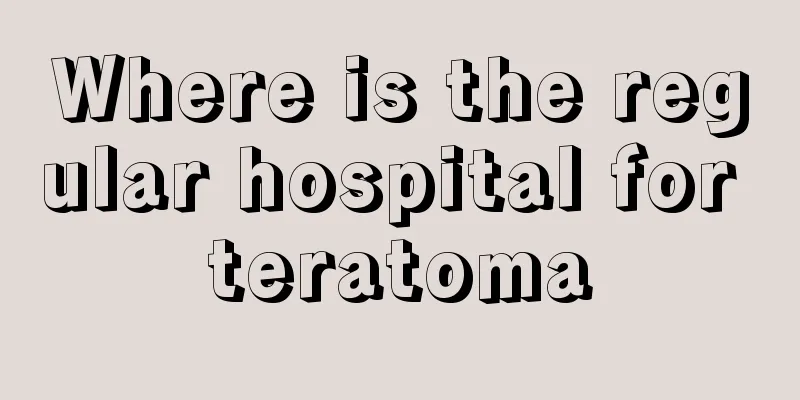What is the difference between gastritis and gastric cancer? Related examinations are needed

|
In life, many people often mistake gastritis for gastric cancer, and they worry all day long. Even if the disease is not serious, it will continue to worsen due to psychological effects; some people mistake gastric cancer for gastritis, do not take it seriously, and miss the best time for treatment. It is recommended that patients who have doubts about their diseases should go to a professional hospital for examination. So, what is the difference between gastritis and gastric cancer? The difference between gastritis and gastric cancer: Gastritis is a general term for inflammation of the gastric mucosa. It is a common disease and can be divided into two types: acute and chronic. Acute gastritis is common in two types: simple and erosive. The former is manifested by upper abdominal discomfort, pain, anorexia, nausea, and vomiting; the latter is mainly manifested by upper gastrointestinal bleeding and vomiting. Chronic gastritis can usually be divided into superficial gastritis, atrophic gastritis and hypertrophic gastritis. The course of chronic gastritis is prolonged, and most of the time there are no obvious symptoms and signs. Generally, only symptoms of indigestion such as fullness after meals, heartburn, belching, irregular abdominal pain, etc. are seen. The diagnosis mainly depends on gastroscopy and gastric mucosal biopsy. This disease is common in adults, and many causes can irritate the stomach, such as improper diet, viral and bacterial infections, and drug stimulation. Gastritis is easy to correct and improve. As long as you get rid of some bad eating habits, actively improve your personal life rules and rhythms, pay attention to your diet, or take some medicines to treat gastritis, you will recover soon. Symptoms are generally confusing and need to be distinguished with the help of gastroscopy or barium meal and other related examinations. More than 70% of early gastric cancer have no obvious symptoms. As the disease progresses, non-specific symptoms similar to gastritis or gastric ulcers may gradually appear, including upper abdominal fullness or pain, heartburn, belching, nausea, occasional vomiting, loss of appetite, indigestion, black stools, etc. Symptoms of advanced gastric cancer (i.e. mid- to late-stage gastric cancer) include pain in the stomach area, which is often gnawing and has no obvious relationship with eating. There is also pain similar to peptic ulcer, which can be relieved after eating. Upper abdominal fullness, heaviness, anorexia, abdominal pain, nausea, vomiting, diarrhea, weight loss, anemia, edema, fever, etc. The main manifestations of cardia cancer are discomfort and pain under the xiphoid process or pain behind the sternum, accompanied by a sense of obstruction when eating or dysphagia; cancer of the fundus and subcardia often has no obvious symptoms, and it is not until the tumor is huge and necrotizes and ruptures, causing upper gastrointestinal bleeding, that it attracts attention, or when the tumor infiltration extends to the cardia, causing dysphagia, that it is taken seriously; cancer of the gastric body is more common in the expansion type, and pain and discomfort appear later; ulcerative cancer is most common on the lesser curvature of the gastric antrum, so the symptoms of upper abdominal pain appear earlier. When the tumor extends to the pyloric orifice, it can cause nausea, vomiting and other symptoms of pyloric obstruction. Don't ignore these five stomach cancer warning signs! Early gastric cancer often has no symptoms or only mild symptoms. When clinical symptoms become obvious, the disease is already in the late stage. Therefore, we must be very vigilant about the early symptoms of gastric cancer to avoid delaying diagnosis and treatment. 1. Upper abdominal pain: This is the most common symptom of gastric cancer. It starts as intermittent dull pain and is often diagnosed as gastritis or ulcer disease. 2. Upper abdominal discomfort: mostly fullness or burning sensation. It can be temporarily relieved and recurred. 3. Symptoms of indigestion such as loss of appetite and belching: manifested as a feeling of fullness after eating and active restriction of diet, often accompanied by repeated belching. 4. Black stool or positive fecal occult blood: If black stool appears without eating blood tofu or taking bismuth or other medications, you should go to the hospital for examination as soon as possible. 5. Fatigue, weight loss and anemia: This is another common but non-specific symptom of gastric cancer. Patients often experience fatigue and weakness due to loss of appetite and blood loss in the digestive tract. If you have stomach pain, stomach discomfort or digestive tract discomfort, you should go to the gastroenterology department of the hospital for a gastroscopy or laboratory test to find out the cause. Those who have irregular lifestyles, busy work schedules, and who eat pickled or moldy food for a long time should have a physical examination and regular screening. Although many people's stomach pain is just common gastritis, there are also many cases that eventually develop into gastric cancer. Some chronic gastric diseases such as gastric ulcer, atrophic gastritis, gastric polyps, etc. are now recognized as precancerous lesions. This reminds people with a family history of gastric disease and recurrent stomach pain symptoms to be vigilant. Currently, the conventional screening methods include the following: laboratory tests (including gastric cancer markers, gastric cancer monoclonal antibodies, gastric cancer occult blood bead method, gastric cancer probability computer model screening, etc.), radiological examinations, endoscopic examinations, and endoscopic ultrasound examinations. The main diagnostic methods for gastric cancer include: gastroscopy, X-ray diagnosis, double contrast gastric angiography, CT examination, endoscopic ultrasound, etc. Early gastric cancer is mainly discovered by gastroscopy. If gastroscopy is not performed, early gastric cancer will further develop into an advanced stage, at which time there are often symptoms such as poor appetite, loss of taste, satiety, anemia, weight loss, etc. Some gastric cancer patients often have gastric cancer syndrome, such as recurrent thrombophlebitis, acanthosis nigricans, pigmentation in skin folds, dermatomyositis, etc. |
<<: Will gastric adenocarcinoma recur after surgery? There is a certain probability
>>: How to prevent gastric cancer and esophageal cancer? It's related to eating habits
Recommend
A sentimental person
Many people usually describe a person's chara...
What are the early symptoms of cervical cancer? Beware of these 3 misunderstandings about cervical cancer
Cervical cancer is a common malignant tumor. If i...
What are the symptoms of insufficient vitality?
Yuanqi is actually defined from the perspective o...
What should bladder cancer patients pay attention to in terms of diet?
Bladder cancer is a disease that can seriously th...
Will eating grapes cause internal heat?
Grapes grow in bunches, purple, green, and crysta...
What causes red, swollen and painful lips?
Lips are also a very important part of the human ...
How to quickly remove the smell of paint
Nowadays, when buying a house, especially a newly...
What's the matter with round spots under the armpits
Few people will find spots under their armpits, b...
Can I eat lychees in the advanced stage of liver cancer? Effective treatment methods for advanced liver cancer
Patients with advanced liver cancer can generally...
How to eliminate forehead wrinkles
If a person's skin is in a dehydrated state f...
How many calories are in one pound of meat
With the change of aesthetic concepts, many femal...
How to escape the curse of sub-health after the holidays?
How to escape the curse of sub-health after the h...
What are the diagnostic criteria for pancreatic cancer
The diagnostic methods for pancreatic cancer incl...
This method of washing red dates will prevent the nutrients from being lost
Red dates are a common food in daily life, especi...
It is necessary to understand the causes of lymphoma
Lymphoma is a common disease that can have a seri...









